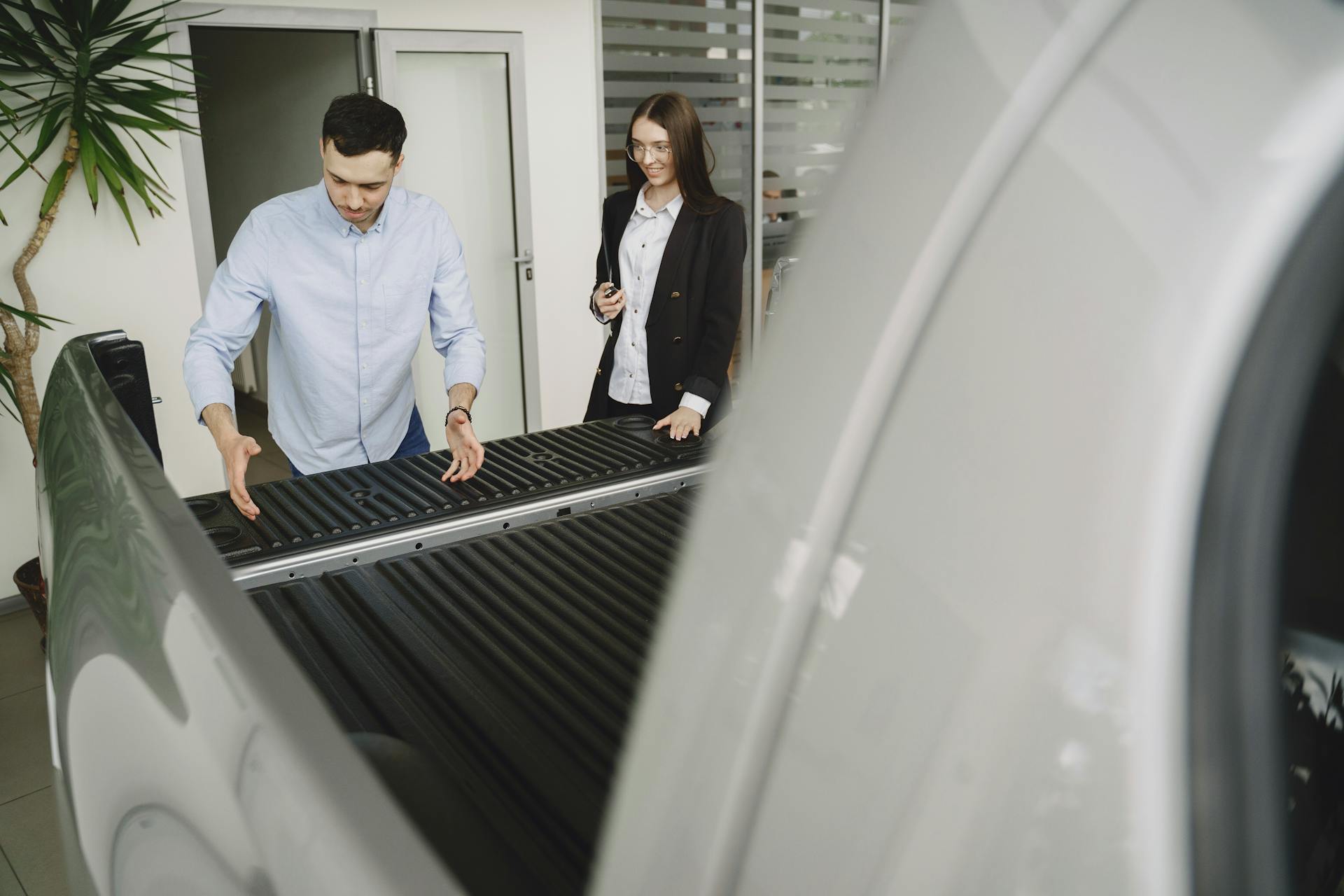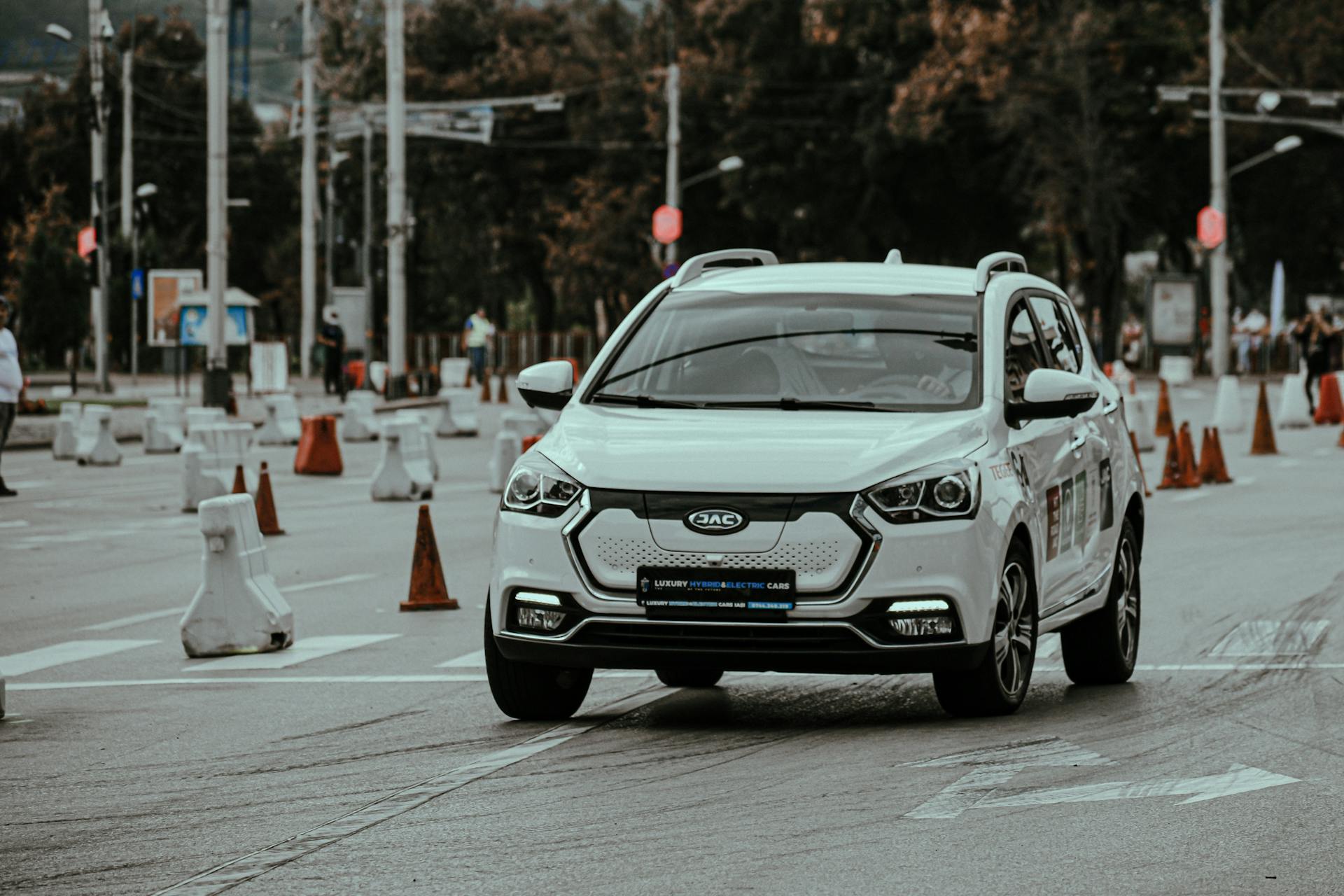
If you're in the market for a new car, you might be wondering whether leasing makes sense for you. Leasing can be a great option if you want a new car every few years, but it's not always the best choice.
Leasing can be more expensive than buying a car in the long run, but it often comes with lower monthly payments. For example, a study found that leasing can save you around $200 per month compared to financing a car purchase.
You should also consider your driving habits. If you put a lot of miles on your car each year, leasing might not be the best choice because you'll be charged for excessive wear and tear.
Consider reading: Best Car Lease Duration
When to Lease a Car
If you need a vehicle for your business, leasing often works better than purchasing a car. You can generally deduct the actual amount of the lease payment, which can lead to a larger tax deduction.

Leasing is also a good option when the need for a car is only temporary. For example, if you're taking a job in a remote location and only need a car for one or two years, leasing can be more cost-effective and less hassle.
If you don't want to deal with surprise repairs or typical maintenance costs, leasing can offer clear advantages. Leases are rarely longer than the term of a manufacturer warranty, and many leases also offer free maintenance for at least the first two years.
You're interested in a luxury car, leasing can bring the monthly payment in line with what it would cost to finance a less-pricey vehicle.
See what others are reading: Re Lease Car
When Temporary Car Need Arises
If you only need a car for a temporary period, leasing is a great option. It can be more cost-effective and less hassle than buying a car, especially if you're only going to need it for a short time.
See what others are reading: What Is the Minimum Credit Score to Lease a Car

For instance, if you're moving to a remote location for work and only need a car for a year or two, leasing a vehicle for that duration might be a better choice. Leasing is made to order for this situation.
You'll need to be careful of mileage, though - most leases come with a provision that limits the number of miles you can drive the vehicle, typically between 12,000 to 15,000 miles. Exceeding these limits can result in costly penalties.
Leasing a car for a temporary period can help you avoid long-term financial commitments and maintenance costs. Plus, you'll always have a brand-new set of wheels, which can be a nice perk!
Broaden your view: Aircraft Engine Leasing Companies
When Payments Are Below Loan Payment
In some cases, the monthly payment on a lease will be lower than what it would be for a purchase. This can happen even with non-luxury vehicles.
The key factor is the amount of cash required up front. If a lease doesn't require a capital cost reduction, and the monthly payment is lower than the loan payment, leasing might make sense.
Check this out: What Is the Average Lease Payment for a Car
You can think of a capital cost reduction as a prepayment of monthly lease payments. Paying this fee upfront can reduce the benefit of the lower monthly payments on the lease.
If the lease doesn't require a capital cost reduction, and the monthly payment is lower than the loan payment, it's worth considering leasing.
Expand your knowledge: Lease a Car Zero down
Leasing Benefits
Leasing can significantly lower your monthly costs, often requiring a smaller down payment compared to buying.
You can enjoy the latest advances in car technology every few years, which is perfect for those who like to stay up-to-date with the latest features.
Many new cars come with a warranty that lasts at least three years, so you can worry-free about repairs during your lease term.
You won't have to worry about resale value, as you simply return the car at the end of the lease, unless you choose to buy it.
If you use your car for business purposes, leasing may offer more tax deductions than a loan, as you can deduct both depreciation and financing costs.
Leasing vs Owning

Leasing a car can be a great option if you want low monthly payments and a smaller down payment. Almost half of new E.V.s were acquired with leases in the second quarter of this year.
With a lease, you can drive a new car every few years and take advantage of the latest models and features. The average new-car loan term is about six years, but with a lease, you can get a new car every 2-3 years.
Leasing an E.V. may also come with a tax break, making deals more affordable. The average transaction price in July was around $48,000 for a new car, and about $25,000 for a used car, according to Kelley Blue Book.
Is It Better to Buy a Car? Context Matters
Buying a car can be a great option if you're looking for the lowest overall cost over the long term. The average interest rate for a new-car loan in August was 7.1 percent, and 11.3 percent for a used-car loan, according to Edmunds.

You'll also have the car debt-free after you finish making payments, which is a big advantage. The average new-car loan term is about six years.
Car prices are still high, with the average transaction price in July around $48,000 for a new car, and about $25,000 for a used car, according to Kelley Blue Book. This means most people who buy a new automobile and many who buy one used get some kind of financing.
Paying cash for your car is interest-free, but it's not always a viable option for many people.
A fresh viewpoint: Car Lease to Buy
A Car: What's the Difference
Leasing a car allows you to drive a new vehicle every few years, typically after 24 or 36 months.
You'll have restrictions on how many miles you can drive and modifications you can make, and various fees will apply.
The lease period ends, and you can return the vehicle to the dealer or purchase it at a predetermined amount, as defined in the lease contract.
Owning a car gives you complete control over all aspects of the vehicle, and you can keep it, trade it in, sell it, or give it away.
You'll have no restrictions on driving, and you can drive as many miles as you want without worrying about mileage limits.
If this caught your attention, see: Leasing a Vehicle with No Credit
Leasing Alternatives

If you're set on a fun-to-drive vehicle with lower-than-average reliability, leasing might be the way to go. At least it's under warranty while you're driving it, and then it's the dealer's headache when you turn it in at the end of a lease.
Leasing can be a good alternative to buying a vehicle with high road-test and owner satisfaction scores but lower-than-average reliability. This is because the manufacturer will handle repairs during the warranty period.
Leasing is a good option if you can find a good deal that also makes financial sense, as it allows you to enjoy a fun-to-drive vehicle without the long-term commitment of buying.
Intriguing read: Is It Worth It to Lease a Car
Why Owning an EV is Smart
Owning an EV can be a smart decision, especially with the rapidly changing market. Prices and rebates on EVs have been fluctuating widely, making it difficult to predict resale values.
Leasing an EV can be a smart choice, but buying one can also make sense if you plan to keep it for a while. According to the data analytics company Experian, 30.7 percent of EV drivers chose a lease in 2023, up from just 9.8 percent in 2022.

You won't have to worry about the vehicle's value depreciating over time, which is a significant advantage of owning an EV. For example, both Ford and Tesla have recently cut the prices of some of their EVs by thousands of dollars.
Battery ranges are growing, charging standards and speeds are changing, and purchase prices are dropping, making EVs a more attractive option for some buyers. If you bought an EV a couple of years ago, it might not even be capable of the fastest kind of fast charging.
Alternative Car Options
If you're not sold on leasing, there are alternative car options to consider. You can buy a car and hold onto it for as long as possible, which can be cheaper overall since new cars lose less value over time.
If you're the handy type, buying a car can be a good option since you'll be able to maintain it yourself and avoid increasing mechanic bills. Cars can lose 15%–25% of their value in the first five years of ownership, but if you plan to keep a car for years, depreciation shouldn't be a major concern.
For more insights, see: Do Car Dealerships Lease Used Cars

You can also consider purchasing a car with a lower price tag, which can make the upfront costs more manageable. Just be aware that you'll still have to deal with the hassle of repairs if the car scores below average in reliability ratings.
In some cases, buying a car can be a better option than leasing, especially if you can find a good deal and plan to keep the car for a long time. Leasing often requires putting down a security deposit, which can be a drawback for some people.
Here's an interesting read: How to Lease a Car and Get the Best Deal
Leasing Considerations
Leasing a car can make sense in certain situations, but it's essential to consider the pros and cons before making a decision.
Lease payments can be lower than loan payments for a purchase, especially if the lease doesn't require a capital cost reduction.
You should also consider the need for a car being temporary, as leasing is made to order for this situation. However, be aware that leases often come with mileage limits, typically 12,000 to 15,000 miles per year.

If you're interested in a luxury car, leasing can bring the monthly payment in line with what it would cost to finance a less-pricey vehicle. However, be aware that specific options and trims may not be available on a discounted lease deal.
Here are some factors to consider when evaluating a lease:
- Sale price: This is negotiated with the dealer, just like a vehicle purchase.
- Length of the lease: This is the number of months you agree to lease the car.
- Expected mileage: The lease sets the maximum number of miles that you can drive the car each year.
- Residual value: This is the vehicle's value at the end of the lease, with its depreciation figured in.
- Rent charge: This fee is shown as a dollar figure rather than a percentage, but it is the equivalent of an interest charge.
- Taxes and fees: These are added to the lease and affect the monthly cost.
When You Need a Business Vehicle
Leasing a vehicle for your business can be a smart move, especially from a tax standpoint. Leasing often works better than purchasing a car because you can generally deduct the actual amount of the lease payment as an expense.
This can be a big advantage over owning the vehicle, where you'd have to break out the amount of the monthly payment between the actual interest paid and the depreciation allowance. Depreciation on a vehicle is written off over several years, so a lease arrangement can provide a larger tax deduction.
Leased vehicles can also be acquired with no down payment, freeing up badly needed capital for other purposes. This can be especially helpful for businesses that need to invest in other areas.
It's worth noting that leased vehicles can be a good option for businesses that only need a vehicle for a short period of time.
Suggestion: Do You Need Money down to Lease a Car
Pros and Cons

Leasing a car can be a great option for some people, but it's essential to consider the pros and cons before making a decision.
Lease payments are generally lower than the monthly loan payments for a new vehicle, depending on factors such as the sale price, length of the lease, expected mileage, residual value, rent charge, taxes, and fees.
You don't have to worry about surprise repairs or typical maintenance costs with a lease, as many leases offer free maintenance for at least the first two years.
Leasing can also be a good option if you want a car with the latest features, as new cars often have the latest safety equipment and better crash protection than older models.
However, leasing can come with some restrictions, such as mileage limits and fees for excess mileage or modifications to the car.
You can't sell the car or trade it in to reduce the cost of your next vehicle with a lease, and you'll always have monthly payments and an ongoing lack of control over certain aspects of a vehicle.
Explore further: High Mileage Car Lease

Fees in your lease contract can add up, including excess mileage fees, modification fees, wear and tear fees, early termination fees, and acquisition fees.
Here are some key factors to consider when weighing the pros and cons of leasing a car:
Overall, leasing can be a good option for some people, but it's essential to carefully consider the pros and cons before making a decision.
Special Cases
If you're considering leasing a car, there are some special cases where it might make more sense than buying outright. For example, if you're in the market for a luxury vehicle, leasing can be a great option because it allows you to drive a high-end car without the long-term financial commitment.
Leasing can also be a good choice if you're in the market for a new car every few years, as it allows you to drive a new car every 2-3 years without having to worry about selling or trading in your old car.

If you have a high-mileage job, such as a taxi driver or delivery person, leasing can be a good option because you can drive a car for a set number of miles without worrying about the long-term cost of maintenance and repairs.
Leasing can also be a good choice if you're not sure what kind of car you want to drive, as it allows you to try out different models and features without making a long-term commitment.
If you're in a area with high insurance costs, such as a city with a lot of traffic, leasing can be a good option because the insurance costs are typically lower for leased cars.
On a similar theme: Is Now a Good Time to Lease a Car
Frequently Asked Questions
When not to lease a car?
Consider leasing a car if you plan to drive a low mileage, but if you need flexibility or have a high driving habit, leasing might not be the best option for you. Leasing can come with restrictions and additional costs, so it's essential to weigh the pros and cons before making a decision.
What is the 1% rule in car leasing?
The 1% rule in car leasing is a calculation that compares your monthly lease payment to the vehicle's Manufacturer's Suggested Retail Price (MSRP), with a lower percentage indicating a better lease deal. Aiming for 1% or less can save you money and get you a more favorable lease offer.
What is the best time to lease a car?
The best time to lease a car is during new car model releases and long holiday weekends, such as President's Day and Memorial Day, when dealerships often offer special deals and discounts. Leasing during these times can help you save money and get a better deal on your vehicle.
Sources
- https://www.moneyunder30.com/when-does-it-make-sense-to-lease-a-car/
- https://www.consumerreports.org/money/car-financing/should-you-lease-your-next-car-a3342848831/
- https://www.fbfs.com/learning-center/5-types-of-people-who-should-lease-their-next-car
- https://www.nytimes.com/2024/09/20/your-money/buy-lease-car-cost-compared.html
- https://www.investopedia.com/articles/personal-finance/012715/when-leasing-car-better-buying.asp
Featured Images: pexels.com


